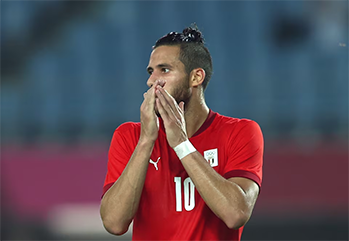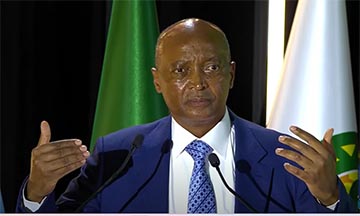International Football
WORLD CUP 2014 STADIUMS BECOME HOME TO CORONAVIRUS VICTIMS
The costly football stadiums Brazil built and refurbished in the run-up to the 2014 World Cup are finding new life as health centres for patients with coronavirus.
Local governments have started signing agreements to use the stadiums – once destined for star-studded matches – as makeshift hospitals and vaccine centres to help deal with an expected surge of Covid-19 cases.
With football in the country suspended until further notice, more than half the clubs in Brazil’s Serie A have given up their stadiums as authorities in densely populated Sao Paulo and Rio de Janeiro seek to expand hospital capacity to deal with the crisis.
Current South American champions Flamengo are giving control of their famous Maracana stadium in Rio de Janeiro to health authorities, said club president Rodolfo Landim.
“In this grim moment, I wanted to invite our great Red and Black nation to renew hope and work for better days. Let us take care of our elders, help those who need it most,” he wrote in a message to supporters.
Authorities in Sao Paulo – Brazil’s biggest city – said they would install 200 beds in a field hospital at the Pacaembu municipal stadium to relieve pressure on the city’s hospitals. Work is already underway at the venue – where football legend Pele played hundreds of matches for Santos FC – while two of the city’s big clubs were also lending a hand.
Santos announced that a temporary clinic would be set up in one of the lounges inside its Vila Belmiro stadium.
Corinthians said they have made their Itaquerao stadium and their training headquarters available “so that the authorities can evaluate how they can be used to combat the spread of the disease”.
On March 23, Allianz Parque, home of the Palmeiras football club in Sao Paulo, a line of people snaked around the outside of the stadium as if a match were about to start. But these were not football fans – they were high-risk Brazilians spaced 3m apart and there to get flu shots.
For Brazilians, it is a useful transformation of structures dubbed “white elephants” that later became symbols of corruption in Latin America’s largest economy.
Back in 2014, the idea of Brazil spending US$11 billion (S$15.7 billion) to host the World Cup was a contentious one, with locals and foreigners alike arguing that a nation struggling to provide basic health care, education and even sewage has no right diverting resources to a football championship.
As construction began, the staggering price tag for the stadiums fuelled a frenzy of protests. One common chant: “We want hospitals with Fifa standards!”
In neighbouring Argentina, six major clubs including Buenos Aires’ Boca Juniors and River Plate have also opened their gates should officials need the space.
Brazil currently has over 4,000 confirmed infections and deaths top 100.
A week ago, Health Minister Luiz Henrique Mandetta had predicted the virus would reach its peak in the country between April and June, anticipating a drop in Covid-19 infections from September.
Mandetta warned the health system in the country of 210 million people could reach saturation by the end of April.
–AFP
International Football
Egypt’s Sobhi sentenced to a year in prison in academic fraud case

Egypt international Ramadan Sobhi, who helped Pyramids win their first CAF Champions League title last season and previously played in the English Premier League, has been sentenced to one year in prison in connection with an academic fraud case, local media reported on Tuesday.
Sobhi was arrested in July upon returning from Turkey, where Pyramids had completed a pre-season camp, following allegations of falsifying official documents and having another individual sit for exams on his behalf at a private tourism and hospitality institute in Giza Governorate, Central Egypt.
The Giza Criminal Court sentenced 28-year-old Sobhi on Tuesday and a second defendant to one year with labor, acquitted a third, and handed a 10-year sentence in absentia to a fourth, who is a fugitive.
Sobhi’s lawyer could not be reached immediately for comment.
In addition to the prison sentence, Sobhi faces a four-year suspension after the Court of Arbitration for Sport confirmed violations of anti-doping regulations in November.
Sobhi, who has played 37 times for Egypt, began his career at Al-Ahly before moving to England in 2016, where he played for Stoke City and Huddersfield Town.
Sobhi joined Pyramids in 2020 from Huddersfield Town, following a loan spell at Al-Ahly, and played a key role in helping Pyramids secure their first CAF Champions League title after defeating Mamelodi Sundowns in the final.
Reuters
Join the Sports Village Square channel on WhatsApp: https://whatsapp.com/channel/0029Vaz7mEIGk1FxU8YIXb0H
International Football
Asian Football Confederation To Launch Nations League Following CAF Move

The Asian Football Confederation has announced plans to introduce an AFC Nations League, just a day after the Confederation of African Football unveiled a similar competition for its member associations.
In a statement released on Sunday, the Kuala Lumpur-based governing body said the new tournament is aimed at improving competition standards and commercial opportunities for national teams across Asia.
While no start date was announced, the AFC confirmed that the competition will be staged during existing FIFA international windows, avoiding congestion in the global football calendar.
AFC General Secretary Windsor John described the initiative as a strategic development tool for the continent’s national teams.
“The AFC Nations League represents an important step forward in our ongoing commitment to support the development of our 47 member associations,” John said.
“By introducing a structured competition platform, we aim to ensure consistent access to high-quality matches while addressing logistical and cost-related challenges faced by national teams.”
The AFC currently organises the Asian Cup every four years, with the next edition of the 24-team finals scheduled to take place in Saudi Arabia in January 2027.
The proposed Nations League would complement the flagship tournament by providing regular, competitive fixtures between Asian national teams.
Asia and Africa now follow a path already taken by Europe, where UEFA launched its own Nations League in 2018. The UEFA competition was designed to replace low-profile friendlies with more meaningful matches, a model that has since been adopted or adapted by other confederations.
With CAF and AFC both moving towards Nations League formats, global football appears to be entering a new era in which structured inter-national competitions increasingly replace traditional friendly matches, offering greater sporting value and commercial appeal.
Join the Sports Village Square channel on WhatsApp: https://whatsapp.com/channel/0029Vaz7mEIGk1FxU8YIXb0H
International Football
CAF Launches African Nations League to Reshape Continental Calendar

The Confederation of African Football (CAF) has announced the creation of a new continental competition, the African Nations League, marking another major reform in African football.
The announcement was made on Saturday, December 20, in Rabat by CAF President Patrice Motsepe, shortly before he unveiled the historic decision to stage the Africa Cup of Nations every four years from 2028.
Modelled along the lines of Europe’s Nations League system, the African Nations League is designed to provide competitive fixtures for national teams outside the AFCON cycle, while also boosting the commercial and sporting value of international football on the continent.
According to Motsepe, the new competition will be held annually between September and December, beginning in 2029. Matches will be played strictly within the international windows approved by FIFA, ensuring that the tournament does not disrupt domestic leagues or club competitions.
CAF confirmed that Africa will be divided into four zones for the purposes of the competition, a structure aimed at reducing travel demands while maintaining high-level competition across the continent. Further details on the format, promotion and relegation system, and prize money are expected to be released at a later date.
The launch of the African Nations League, coming alongside the shift of AFCON to a four-year cycle, signals CAF’s intention to modernise its calendar, improve player welfare, and create more meaningful international matches for African national teams throughout the season.
Join the Sports Village Square channel on WhatsApp: https://whatsapp.com/channel/0029Vaz7mEIGk1FxU8YIXb0H
-

 AFCON1 week ago
AFCON1 week agoFrom AFCON Touchlines to Timeless Journeys: A Sports Reporter’s Pilgrimage to Ibn Battouta’s Museum in Tangier
-

 AFCON1 week ago
AFCON1 week agoBREAKING! CAF bans Eto’o over AFCON conduct
-

 AFCON5 days ago
AFCON5 days agoSenegal coach Thiaw jeered by journalists, walks out of press conference
-

 AFCON7 days ago
AFCON7 days agoHooves, History and Headlines: A Sports Reporter’s First Cart Ride in Marrakech
-

 AFCON1 week ago
AFCON1 week agoSuper Eagles Target Record-Extending Ninth AFCON Bronze as Nigeria Face Egypt in Casablanca
-

 AFCON1 week ago
AFCON1 week agoFifty Years On, Nigeria and Egypt Renew AFCON Bronze Rivalry in Casablanca
-

 AFCON7 days ago
AFCON7 days agoMorocco Seek to End 50-Year Wait for Second AFCON Title Against Senegal
-

 AFCON1 week ago
AFCON1 week agoA Return to Cristiano Ronaldo Hotel




